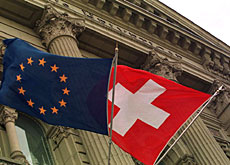Swiss firms keep new Europe at arm’s length

Fears that an enlarged European Union would snatch jobs and production away from Switzerland to eastern Europe have failed to materialise, according to a report.
A survey of 966 Swiss small and medium-sized enterprises (SMEs) found only 2.4 per cent more firms doing business in the ten new EU countries since enlargement with few having or planning production plants.
The Osec Business Network Switzerland report, released in Zurich on Monday, dampened concerns that EU enlargement on May 1, 2004, would lead to a flood of Swiss firms setting up shop in the new member states to take advantage of cheap labour.
The amount of business being done by Swiss firms in these countries, many of them in eastern Europe, is increasing steadily, but it is largely confined to the export and import of goods as opposed to production.
Some 96 per cent of surveyed firms doing business in the new EU member states have kept their production lines in Switzerland with just under five per cent of these companies intending to transfer them abroad in the near future.
Corruption
Part of the reason appears to be related to concerns over corruption, overbearing bureaucracy and a lack of suitable business partners and infrastructure, such as telecommunications and transport in the countries concerned.
Other problems highlighted by companies in the survey included language barriers, differences in business mentality, lack of qualified workers and lower quality controls.
“A lot of companies told us that they want to keep production in Switzerland to maintain Swiss standards of quality,” report co-author Stephanie Raimander told swissinfo.
“For a lot of smaller companies it is simply too problematic to move their operations abroad in the light of certain difficulties they may experience.”
Neutral
EU enlargement has made little or no difference to most companies in the report with nearly 70 per cent reporting a neutral effect on their business in these countries. Only 5.9 per cent have seen a negative effect and 17.5 per cent say enlargement has been positive.
Switzerland’s largest trade union, Unia, said it was not surprised by the survey’s findings as fears over a job drain caused by EU enlargement have been evaporating for some time.
“There was a perceived threat two years ago, but that did not turn out to be as apocalyptic as the right-wing was expecting,” spokeswoman Anne Rubin told swissinfo.
Rubin added that Unia was more concerned about the threat of wage dumping in Switzerland than with jobs being lost by outsourcing abroad, when the Swiss voted to extend a labour accord to the new EU states last September.
swissinfo, Matthew Allen in Zurich
The 10 new member states, that joined an enlarged EU on May 1, 2004, are: Cyprus, the Czech Republic, Estonia, Hungary, Latvia, Lithuania, Malta, Poland, Slovakia and Slovenia.
In November 2005 Osec surveyed 966 Swiss small and medium sized enterprises about their business links with these countries.
Of these companies, 28.3% did business in the 10 countries before they joined the EU. This figure rose to 30.7% between May 1, 2004 and November 2005, an increase of just 2.4%.
Exports from Switzerland to the 10 countries rose from SFr3.69 billion in 2002 to SFr4.74 billion in 2005. Imports also climbed from SFr2.5 billion to SFr3.3 billion in the corresponding period.
In the Osec survey, 69.3% of companies said the EU enlargement had a neutral effect on their business. Some 17.5% said it had a positive effect while 5.9% said it was negative.
A third of companies that do business in these countries said increased competition since enlargement had resulted in pressure on prices. Half said there were no negatives to speak of, while a third said there were no advantages to their business.
Of the Swiss companies that do not do business in these countries, three quarters felt EU enlargement had brought no advantages while 64% said there no disadvantages.
Some 60% of Swiss firms that did business in the 10 countries before May1, 2004, were planning or had already increased the size of their operations there.

In compliance with the JTI standards
More: SWI swissinfo.ch certified by the Journalism Trust Initiative




You can find an overview of ongoing debates with our journalists here. Please join us!
If you want to start a conversation about a topic raised in this article or want to report factual errors, email us at english@swissinfo.ch.